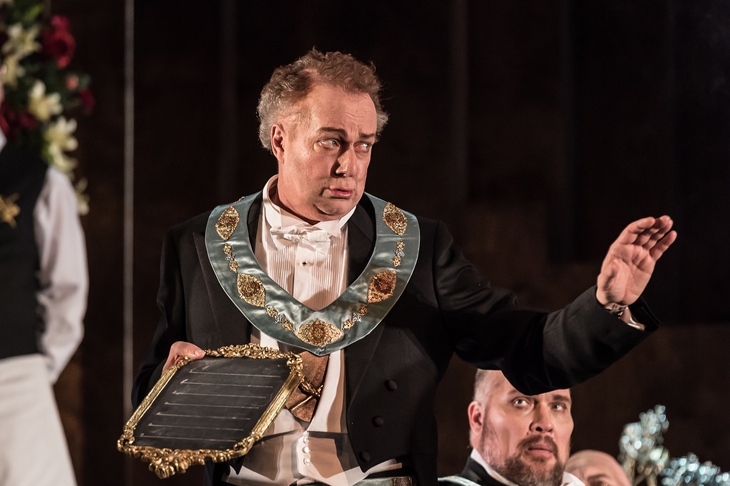I don’t think that I have left a theatre many times feeling as depressed and irritated as after the Royal Opera’s Die Meistersinger, in the new production by Kasper Holten. The run of the Royal Opera’s recent productions of Wagner — appalling Tristans, a dire succession of Parsifals, mediocre Rings — hadn’t prepared me for so deep an abyss of irrelevant idiocy as this. I thought I had reached the stage where, having seen so many fearful operatic productions of works I love, I was able to enjoy myself purely on account of the music, almost inured to what I was seeing. On this occasion, the musical level was uneven and sometimes quite bad, but even if it had been uniformly wonderful it would have been sabotaged by Holten’s direction, as Eugene Onegin and Don Giovanni were, only far more so.
Act One takes place in a London club, not a church as Wagner mistakenly thought. So the opening chorale is a chorus practising, with Hans Sachs — who Wagner scheduled to make his entry half an hour later — monitoring events at the front. The contrast between the sacred atmosphere of the church and the urgency of Walther’s passion for Eva is thus removed. Holten, shocked that women aren’t allowed in some London clubs, has them entering with their husbands the Masters, but then having to leave. All the while there are irrelevant little things going on and distracting from what is anyway a fairly complex storyline, and this fussiness gets ever more pervasive as the opera progresses. The club setting is so elaborate that it has to make do for Act Two as well — which Wagner set in the street between Sachs’s and Pogner’s houses — with no atmosphere at all. The famous elder tree is replaced by a couple of potted plants, and the complicated arrangements with Magdalene at the window mean there is nowhere for the lovers to hide. Enter Beckmesser with his lute, except that he doesn’t have one, but a clavichord is at hand, which he plays. It turns up again conveniently for his attempted prize song in Act Three. It’s hard to tell whether the devastating riot with which the act ends takes place or is a figment of Sachs’s imagination. But anyway it isn’t a riot, just lots of people crowding the stage, and failing to disappear in an instant — one of Wagner’s most brilliant but apparently, for Holten, superfluous inspirations — when the cloven-hoofed Night Watchman appears.
Act Three — we are now supposed to be in Sachs’s workshop — is the same only the scenery has moved round so that we see a bewildering array of metalwork, as if Sachs were in charge of a factory. While he sings the concluding passage of his ‘Wahn’ monologue, the most profound and moving passage in the whole score, Walther wakes up from his brief sleep and stretches and does all he can to draw attention away from Sachs’s remarkably elaborate reflection. Holten makes sure that at any moment there is lots going on, most of it his invention. Perhaps the most startling of his improvements is to change the ending, so that instead of Walther and Eva looking forward to their marriage, she is suddenly struck with horror to find herself oppressed by a male hegemony, and rushes horrified from the scene.
There is a good cast, and the orchestra is superb as always. But Antonio Pappano’s conducting is strange. In the podcast on the Royal Opera’s website he explains the structure of the Overture with brilliant insight, yet the actual performance of it never achieved lift-off, sounding as if he was so in love with the innumerable delightful details that it seemed to alternate between bombast and stagnation. And though his tempi were moderate (the performance ended 15 minutes early) they often dragged.
Pappano was, as always, most attentive to and supportive of his singers, though he and Bryn Terfel didn’t always agree on tempi; but Terfel’s Sachs was a great account, though necessarily less moving than in Cardiff, where he had Richard Jones’s ideal production — one that was taken over by ENO and resulted, two years ago, in performances which this doesn’t begin to compare with. Gwyn Hughes Jones’s Walther, dressed from a charity shop, was strongly and intelligently sung, but he was presented as a slob. Stephen Milling was the only serious disappointment as Pogner, that moving role for which a sturdy bass is required. Johannes Martin Kränzle was a reasonable Beckmesser, but shed no light on that intriguing character. Of the women Hanna Hipp made a fine, bossy Magdalene, while Rachel Willis-Sorensen as Eva moved rapidly from schoolgirl to hausfrau, and her lovely singing of the opening of the Quintet was ruined by the scenery starting to move again. But that’s what it was all like.
If it is broadcast, it may come across as a decent performance, but to see it is a disaster.






Comments